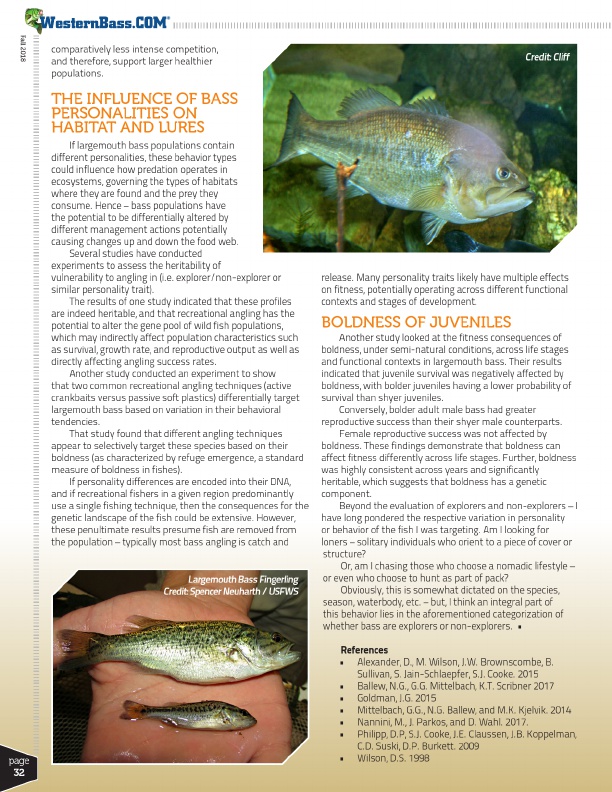
®
Fall 2018
page
32
comparatively less intense competition, and therefore, support larger healthier populations.
Credit: Cliff
THE INFLUENCE OF BASS PERSONALITIES ON HABITAT AND LURES
If largemouth bass populations contain different personalities, these behavior types could influence how predation operates in ecosystems, governing the types of habitats where they are found and the prey they consume. Hence – bass populations have the potential to be differentially altered by different management actions potentially causing changes up and down the food web.
Several studies have conducted experiments to assess the heritability of vulnerability to angling in (i.e. explorer/non-explorer or similar personality trait).
The results of one study indicated that these profiles are indeed heritable, and that recreational angling has the potential to alter the gene pool of wild fish populations, which may indirectly affect population characteristics such as survival, growth rate, and reproductive output as well as directly affecting angling success rates.
Another study conducted an experiment to show that two common recreational angling techniques (active crankbaits versus passive soft plastics) differentially target largemouth bass based on variation in their behavioral tendencies.
That study found that different angling techniques appear to selectively target these species based on their boldness (as characterized by refuge emergence, a standard measure of boldness in fishes).
If personality differences are encoded into their DNA, and if recreational fishers in a given region predominantly use a single fishing technique, then the consequences for the genetic landscape of the fish could be extensive. However, these penultimate results presume fish are removed from the population – typically most bass angling is catch and
Largemouth Bass Fingerling Credit: Spencer Neuharth / USFWS
release. Many personality traits likely have multiple effects on fitness, potentially operating across different functional contexts and stages of development.
BOLDNESS OF JUVENILES
Another study looked at the fitness consequences of boldness, under semi-natural conditions, across life stages and functional contexts in largemouth bass. Their results indicated that juvenile survival was negatively affected by boldness, with bolder juveniles having a lower probability of survival than shyer juveniles.
Conversely, bolder adult male bass had greater reproductive success than their shyer male counterparts.
Female reproductive success was not affected by boldness. These findings demonstrate that boldness can affect fitness differently across life stages. Further, boldness was highly consistent across years and significantly heritable, which suggests that boldness has a genetic component.
Beyond the evaluation of explorers and non-explorers – I have long pondered the respective variation in personality or behavior of the fish I was targeting. Am I looking for loners – solitary individuals who orient to a piece of cover or structure?
Or, am I chasing those who choose a nomadic lifestyle – or even who choose to hunt as part of pack?
Obviously, this is somewhat dictated on the species, season, waterbody, etc. – but, I think an integral part of this behavior lies in the aforementioned categorization of whether bass are explorers or non-explorers. •
References • Alexander, D., M. Wilson, J.W. Brownscombe, B.
Sullivan, S. Jain-Schlaepfer, S.J. Cooke. 2015 • Ballew, N.G., G.G. Mittelbach, K.T. Scribner 2017 • Goldman, J.G. 2015 • Mittelbach, G.G., N.G. Ballew, and M.K. Kjelvik. 2014 • Nannini, M., J. Parkos, and D. Wahl. 2017. • Philipp, D.P, S.J. Cooke, J.E. Claussen, J.B. Koppelman,
C.D. Suski, D.P. Burkett. 2009 • Wilson, D.S. 1998